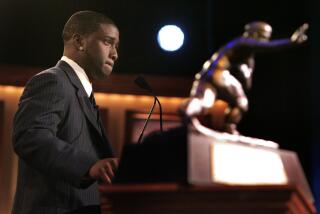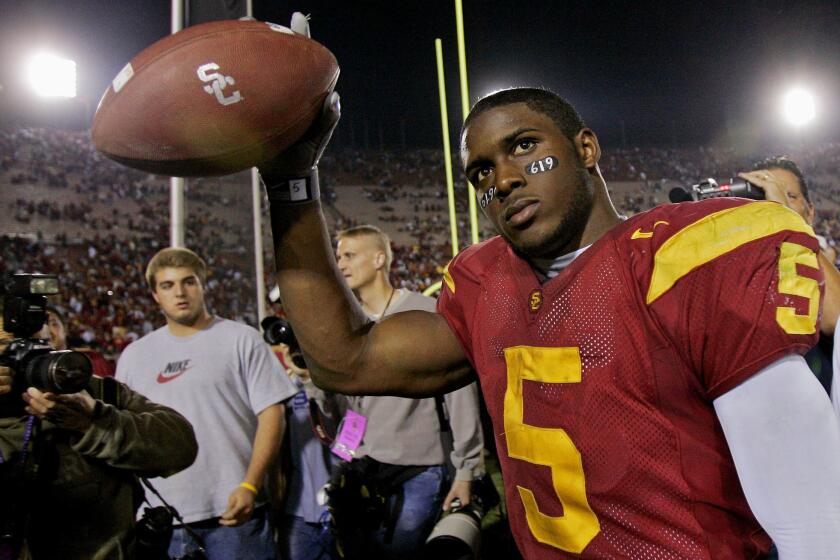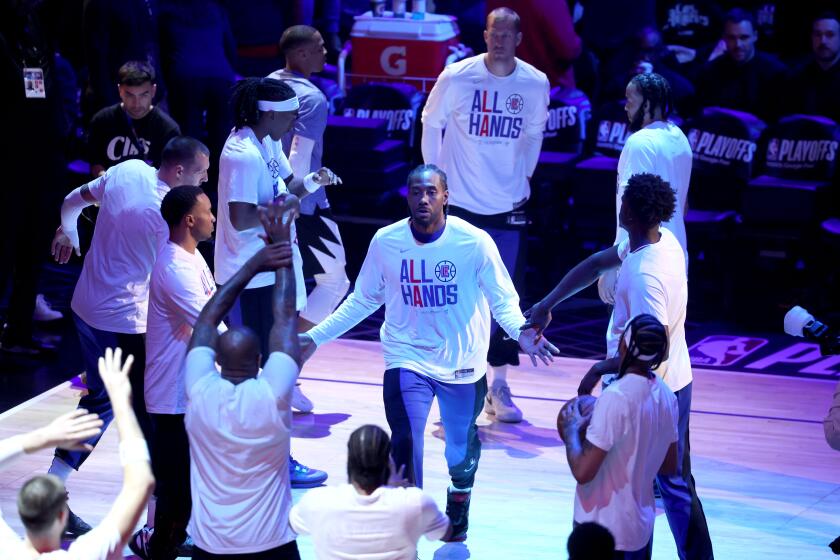Mothers know best when it comes to family matters
There is this image:
Kim Clijsters celebrating a U.S. Open championship on Arthur Ashe Stadium Court with a combination of tears and a joyous smile as her 18-month-old daughter Jada toddles around with sweet abandon.
Clijsters was the first mother in 29 years to win a Grand Slam tennis tournament. She was 26 and only three months out of a two-year-retirement. The Belgian had quit sports while at the top of her game, was married, had a daughter and then triumphantly came back to the courts.
“It’s not easy,” Clijsters said. “But it’s worthwhile.”
And there is this image:
Lorena Ochoa, 28, the world’s No. 1-ranked golfer last Sunday sobbing on a golf course in Mexico as she finished her last tournament before retirement. Ochoa, who is committed to spending more time with her new husband and his three children, is officially done with golf now. She has spoken of wanting to have a child of her own.
This might not feel like a happy Mother’s Day to the LPGA Tour, which has now lost its most marketable star, but the consensus among a number of women athletes is that there is no blueprint for life’s decisions — and that no retirement decision is ever final.
Top female sports stars such as Clijsters, Candace Parker, Lisa Leslie, Kerri Walsh, Dara Torres and Lindsay Davenport have wrestled with the same decisions that caused Ochoa to step away from golf.
Parker, one of the few female athletes to star in an ESPN promotional commercial, shocked the sports world when she announced she was pregnant and would miss a portion of a WNBA season for the Sparks. She gave birth to daughter Lailaa on May 14, 2009, just before the start of her second year in the league and when she was the defending MVP.
Clijsters was ranked No. 3 in the world in women’s tennis when, at age 23, she suddenly left the game to, as she put it, concentrate on a new marriage and starting a family.
Davenport stepped away from tennis when she was ranked No. 2 in the world to have a son, Jagger. She won her first tournament back, but retired for good 18 months later when she became pregnant with daughter Lauren.
Two-time Olympic beach volleyball gold medalist Walsh is on a sports break now. Her second child is due sometime this month, but she says it is driving her crazy, sitting at home and watching volleyball partner Misty May-Treanor playing without her. But Walsh has already figured that she and May-Treanor will team up again to win a third Olympic gold medal, this time in London in 2012. It hasn’t occurred to her, Walsh said, to use the word “retirement.”
Leslie, 37, has a 1-month-old son, M.J., to go along with her nearly 3-year-old daughter, Lauren. She played basketball after Lauren was born, but she’s done with competitive sports now. Leslie understands that every woman, athlete or not, makes the decision of whether and when to give birth for very different reasons.
“For me it was a conscious decision to wait,” Leslie said. “Part of me felt like I owed it to my teammates, the league and to USA Basketball [she has four Olympic gold medals] to play at the top level for as long as possible.”
“But I totally understand where Candace came from and what Lorena might be thinking too. There is no wrong answer.”
Davenport, 33, said she and her husband, Jon Leach, were together nearly eight years before deciding to have Jagger in 2007.
“I waited so long,” Davenport said, “because it seemed like no one in my sport had done it for over 20 years.” Evonne Goolagong-Cawley had been the most highly ranked tennis player-mom to play on the tour before Davenport.
“I thought maybe having a child would be the end of me physically,” Davenport said. “A future on the tour, with the travel, working out, that future was unseeable to me. Then I was pregnant about two months and started thinking, ‘I’m not ready to give up. I want to play again.’
“When I look back now, if I knew how it works, seeing what Kim’s doing, maybe I would have done it differently and had my first child younger and then come back.”
Even as women athletes have become established as professionals in sports as traditional as tennis and golf as well as later-arriving leagues such as the WNBA and Olympic sports such as soccer and beach volleyball, there is still no one-and-only best way to do the thing many young women want to do — start a family.
“Having an athletic career and a family are not mutually exclusive,” Parker said. “I always have wanted both.”
There was sniping on message boards that Parker was letting down her sport when she first announced her pregnancy. There was the question as to whether she would have the desire to play pro basketball again.
The answers were made clear over the last 10 months or so. Parker helped get the Sparks to the playoffs last season and in this off-season played pro basketball in Russia.
Lisa Fernandez, a three-time USA softball Olympic gold medalist and now a coach at UCLA, made the choice to postpone motherhood until she was 35.
“I did it that way because I thought I was ready to be away from the sport,” Fernandez said.
It didn’t turn out exactly that way. After the birth of her son Antonio in 2006, Fernandez decided to try to make one more Olympic team. She was a late cut, but Fernandez was glad she tried. She was also glad she didn’t make final career decisions while she was pregnant.
“I never shut the door on anything,” Fernandez said. “I don’t think you can. You just can’t know what you’ll want after your child comes.”
Swimmer Dara Torres was 39 when he gave birth to daughter Tessa. Fifteen months later, as a 40-year-old mother, she won a 100-meter freestyle gold medal at the U.S. Nationals. Torres, who is promoting a new memoir called “Age is Just a Number,” went on to win three silver medals at the 2008 Beijing Olympics as a 41-year-old and she’s still not sure about retirement.
About motherhood, though, Torres is adamant. Women should have their children on whatever timetable they feel is appropriate.
“You do it for yourself,” Torres said. “Lorena is so young, but she’s doing what she thinks is right.”
This leads Davenport to offer one piece of advice to young women athletes who decide to put family first.
“Don’t use the word ‘retirement,’ ” Davenport said. “Then when you come back you don’t have to un-retire.”
twitter.com/mepucin
More to Read
Get our high school sports newsletter
Prep Rally is devoted to the SoCal high school sports experience, bringing you scores, stories and a behind-the-scenes look at what makes prep sports so popular.
You may occasionally receive promotional content from the Los Angeles Times.






